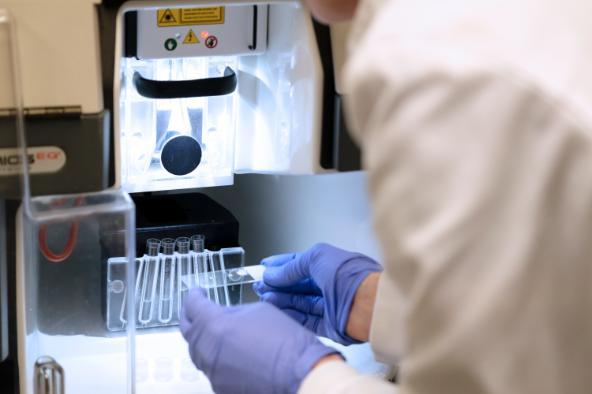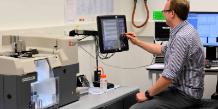Hands-On Flow Cytometry Course

23rd – 26th June 2026
Please contact btf-enquiries@york.ac.uk for further information
Introduction An intensive, hands-on, four-day training course in the varied techniques using flow cytometry.
A very well run, enjoyable and informative course. I would definitely recommend to future users. I wish I had taken this course a few years ago.
The course will initially cover basic flow cytometry but then rapidly move on to the more advanced applications. These will include cell cycle, apoptosis, cell proliferation, GFP and other fluorescent proteins, FRET and receptor quantification. The course has been designed to allow the participant to gain experience of what a flow cytometer is capable and to raise awareness of the problems that can be encountered. To demonstrate each technique, a wide range of both samples (plants to cell culture) and labels (antibody to fluorescent proteins) will be used. Participants are welcome to bring their own samples.
The course is taught by academic and research staff of the University of York Technology Facility, guest specialists from over the UK as well as Beckman Coulter's own applications specialist. Guest specialists will give an initial talk on their specialised techniques and will then participate in the running of the practical sessions.
We welcome delegates from both academia and industry throughout the UK, Europe and the rest of the world. The course also caters from the novice to those already familiar with flow cytometry.
Course Benefits This intensive, four-day training course will be of value to anyone wanting to gain hands-on experience of modern flow cytometric techniques. In addition to the hands-on component, the course will include tutorials on the theory and practice of all the techniques and methods covered, as well as many other relevant topics in the field.
An essential feature of our course is the unique combination of practical, laboratory-based work with both taught and tutorial-style classroom sessions. The Technology Facility labs are extremely well equipped for modern flow cytometry, with the CytoFlex S (4 laser) and LX (6 laser); Fortessa X20 (4 laser)
flow cytometers and lasers which are a variation of 375nm, 405nm, 488nm 561nm, 633nm and 808nm. Participants will have the opportunity to analyse their own samples during the free format session or to cover previous work where appropriate.
Course Programme
The course schedule will involve a tutorial each morning on the techniques relevant to the day's practicals.
Hands-on laboratory activities will include:
- Operation of a flow cytometer
- Multicolour flow and compensation
- Cell Cycle, ploidy and apoptosis
- Fluorescent Proteins
- Cell Proliferation
- Receptor Quantification
- FRET - fluorescent resonance energy transfer
Derek Davies (CRICK) will be guest speaker and will demonstrate on Wednesday.
There will be ample opportunities during the evenings for further discussion with the course tutors in more informal surroundings.
A preliminary programme is shown below:
| Day | Aims |
|---|---|
| Day 1: Basics | Familiarisation, multicolour flow and compensation |
| Day 2: DNA assays | Cell Cycle, Ploidy, Apoptosis, Live-Dead |
| Day 3: Cell and protein analyses | Cell proliferation, receptor quantification |
| Day 4: Fluorescent Proteins studies | FRET and Cell sorting demo |
Course Tutors
- Peter O'Toole, Technology Facility, Department of Biology, University of York
- Derek Davies, The Francis Crick Institute, London
- Karen Hodgkinson, Technology Facility, Department of Biology, University of York
- Karen Hogg, Technology Facility, Department of Biology, University of York
- Jo Marrison, Technology Facility, Department of Biology, University of York
- Graeme Park, Technology Facility, Department of Biology, University of York
- Ian Brotherick, Beckman Coulter
Venue and Accommodation
The course will use the resources and instrumentation of the Technology Facility, which is part of the Department of Biology and is housed in a £25M building completed in 2002.
Accommodation for Tues-Thurs is included in the course fees. Pre and post course accommodation is also available for an additional cost provided sufficient notice is given. All accommodation will be at the Hotel Indigo in York city centre.
This historic walled city with its medieval guild halls and hostelries offers many attractions for the visitor, including the Jorvik Viking Centre, the National Railway Museum, York Minster, York Castle Museum, Clifford's Tower and the Merchant Adventurers' Hall. York is set in the centre of the Vale of York with the Yorkshire Dales, Moors and Wolds, and stately homes and other attractions are all within easy reach.
Registration
23rd – 26th June 2026
The registration fee covers accommodation on Tuesday, Wednesday and Thursday nights, all meals (except Wednesday evening), refreshments, tuition, laboratory consumables, a bound copy of all course notes. There will be special course dinners on the Tuesday and Thursday evening in the historic city of York. Delegates are free to make their own arrangements on Wednesday evening, either in a dining room or snack bar on campus or in York City Centre.
The course investment fee is: £1450 Academic Rate (incl 3 nights accommodation at a 4* hotel) | £1850 Industrial Rate (incl 3 nights accommodation at a 4* hotel)
As the number of places is limited to permit full hands-on practice, early registration is advised. To register for the Flow Cytometry Hands-on Course, please fill in the registration form Reg_Form_Flow_23-26_June_26 (PDF ![]() , 218kb) and email to btf-enquiries@york.ac.uk
, 218kb) and email to btf-enquiries@york.ac.uk
Refund Policy
The full registration fees are payable in advance and there is a 10% administrative charge for cancellations received in writing up to 20 working days before the start of the course. No refunds will be made for cancellations received within 20 working days of the course start date or for the inability to attend the course for whatever reasons. The University is not liable for non-attendance due to travel disruptions, health problems or any other reason that might lead to a delegate not being able to attend the course. You are strongly advised to ensure you have appropriate insurance. Substitutions may, of course, be made at any time, providing you inform us in writing.
How to get here
The University of York enjoys a splendid campus location just two miles from the centre of York itself. Getting to York is easy from anywhere in the world. There are excellent rail links which have a short travel time to international airports and we have easy to access major road networks.
The Biology Department is within Campus West at the University and maps and travel information can be found by visiting: https://www.york.ac.uk/about/maps/
More Information
For any further questions concerning the course itself, please contact:
Dr Peter O'Toole
Department of Biology (Area 15)
University of York
York YO10 5DD
UK
Tel: +44 (0)1904 328722
Fax: +44 (0)1904 328804
E-mail: peter.otoole@york.ac.uk

